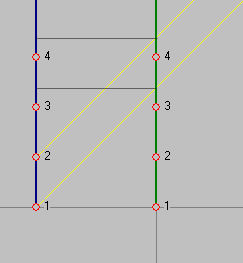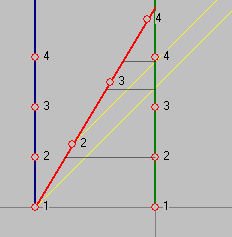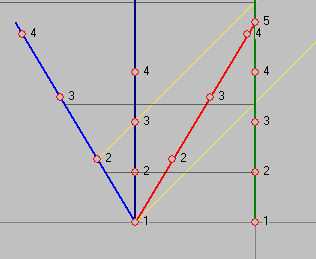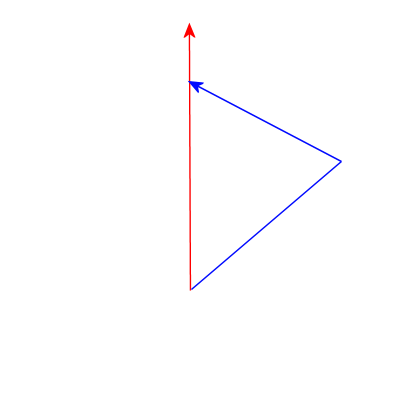Leaderboard
Popular Content
Showing content with the highest reputation on 07/16/18 in all areas
-
As I said in my previous post. Relativity makes no such claim when it comes to what an observer will visually see. This is a straw-man argument based on a misrepresentation of Relativity. To explain the difference between what the observer would visually see vs. what he is conclude is happening, we'll use some space-time diagrams. First consider two clocks separated by some distance and stationary with respect to each other. The blue line is our "observed" clock and the green line is our "observing" clock. The scale is such that light, shown as the yellow lines, is drawn at a 45 degree angle. Thus our observer will see light that left the blue clock when it read 1 arrive when his clock reads sometime after 3, and he will see the blue clock read 1 at that time. He also will see the light that left the blue clock when it read 2 arrive sometime after his clock reads 4. However, this does not mean that he will think or conclude that what he sees actually represents what time it is for the blue clock at those moments. That would be shown by the black horizontal lines, which shows that when the green observer sees the blue clock read 1, he knows that it actually reads the same as his own, or somewhat after 3, and when he sees the blue clock read 2, it actually at that moment reads somewhat after 4. Now let's add a third clock, one that is moving at 0.6c relative to the both clocks so that it and the blue clock are closing in on each other. This will be the red line in the following diagram. The light that left the red clock when it read 1 still arrives at the blue clock when the blue clock reads somewhat after 3. But the light that left when it read 2, arrives before the blue clock reads 4. The blue clock observer will in fact see the red clock ticking at a rate twice as fast as his own. But again he will not conclude that this means that this represents what time it actually is at the blue clock. When he sees the blue clock read 1 he will conclude that it reads a bit before 3 at that moment and when he sees it read 2, he will conclude that reads something before 3.5 at that moment, as shown by the black lines. He knows that the light carrying the image of the blue clock reading 2 left the blue clock when it was closer to him than the light carrying the image of it reading 1 left the blue clock. His has to account for this when determining when exactly that light left according to his own clock. As the black line from his clock reading 2 shows, the red clock didn't actually read 2 until sometime after his clock read 2. Thus after accounting for the time it took for the light from the red clock to reach him, he will conclude that the red clock is ticking slower than his own. This is time dilation. Now add yet another clock, this time so that it and the observer are receding from each other, as shown by the light blue line. Again the light leaving when it reads 1 arrives at the green observer when the green clock reads after 3. But the light leaving it when it reads 2 doesn't arrive until the green clock read after 5. The green observer will see the blue clock ticking at 1/2 the rate of his own. But this time, the light blue clock is further from the green when it reads 2 than it was when it read 1, and when the green observer takes this into account, it will turn out that when compared to his own clock, the light blue clock is ticking slower than his own, and by the same rate as he concluded that the red clock is ticking slow. The light blue clock exhibits the same time dilation as the red clock. This is what Relativity says is happening in the real universe, and this is not you you are trying to claim it says ( that an observer will always see a clock as running slow). If you are going to argue against a theory, you have to argue against the actual theory rather than some imagined version of your own creation.3 points
-
I can't say I've ever thought a high-ranking UK judge showed any overt political-bias in a case but it's rampant in the US and actually accepted, with Supreme Court judges chosen for it. Is this a wise way to pursue justice? Should not lawmakers and judges be distinct, whereby the former make the laws and the latter ensure they are lawful and consistent with existing statutes, and not just to ensure those laws pass because they are "on their side"? I personally think the US system of choosing judges is rank. That's my opinion.2 points
-
I don’t think it goes against evolution; the ability/need to believe (in something) seems to be a fundamental part of human nature.1 point
-
I think it depends on the other experimental details. Can you post them? If I was trying to measure I2 in CCl4 I might start with a colourimetric assay unless I really needed good precision.1 point
-
1 point
-
Logic implies premises, rationality does not. So no, I think the original was best put. I also note that eveyone has so far assumed that religion is about 'good'. Why so? How about self worship? Or the worship of Mamon? Are they not both rational in that they are compatible with the principle of natural selection and the theory of evolution? Zapatos have I stirred your pot enuff?1 point
-
The OP question is probably the wrong one. It would make more sense to ask if there is a LOGICAL reason for religion. Lots of rational people are religious. I'm not so sure about how logical their reasons for believing are. Does the belief follow on logically from facts they can be sure of? What happens is that people compartmentalise religion. They reserve a much lower standard of proof for religious beliefs than for other day to day information. I suppose a perfectly rational person can argue that religion is a good thing, whether true or not. But are they perfectly logical?1 point
-
Durn it. Must be something I did in a past life, wrecked my chances of a +1 point
-
Yes indeed. In the US there is a serious lack of separation and mutual critical oversight between the judicial and political pillars. You've got religion messing it up as well. We have another oversight mechanism in the Royal Assent, of which, the Queen's team scrutinises any laws before receiving it.1 point
-
Ever notice when an alarm sounds that most people sit around wondering how this could happen rather than doing something about it? The Alarm has been sounding here for decades but the people keep allowing the fire to spread while arguing if there is a fire or not...1 point
-
This is 7 years old, but this article on the appointment of a UK Supreme Court judge illustrates the glaring difference in attitude of the respective national judiciaries. Note how the appointee is warning of the politicisation of the UK judiciary: https://www.theguardian.com/law/2011/nov/08/supreme-court-appointee-judges-politicised1 point
-
My grief is usually postponed, sometimes by weeks but then I cry incessantly over something that has nothing to do with my actual grief. With apologies too @Markus Hanke if Karma was real I know several people who would burst into flames right now...1 point
-
1 point
-
You should give us some more boundary conditions of your assignment. A good economic analysis of the production of a chemical is quite difficult! It involves a comparison of multiple reaction routes, and includes an estimate of the costs of the factory for all routes (investment and operating costs). I kinda doubt that your assignment is that complex. Have you found any papers yet that describe the reaction routes? Maybe you can post the links you found so far here, then we can point out what is important in those. But please do not expect us to do a literature search for you. That is your homework, not ours!!1 point
-
"Please read entire post there is very important work in some of the parts" Just post those parts.1 point
-
Yes. It deactivates some bacteria and viruses by denaturing their outer membrane. I always have it around because it''s the most smear-free cleaner.1 point
-
1 point
-
SR does not claim that such an observer will always see the Earth clock run slow, if by see, you mean what his eyes or instruments directly record. In this usage of see, he will see it run at a rate of T = To ((1-v/c))(1+v/c))1/2 where v is positive if Earth and the Observer are receding from each other and negative if they are approaching each other. A factor contributing to this observation is the the distance and thus the propagation time for signals is constantly changing, getting longer when receding and getting shorter when approaching. This factor works out to be c/(c+v) When you factor this out of the first equation you are left with the time dilation equation. This means that there are two things to consider: what you see happening to the Earth clock, and what is happening to the Earth clock. So while while receding from the Earth, the observer will see the the 1000 Hz signal as being 500 hz and the Earth clock as ticking 1/2 as fast as his own,. Taking into account the effect of the increasing distance, he will determine that the Earth clock is ticking 0.8 as fast as his own. He will meet up with the object when his own clock reads 1.01.2022 (as the distance between Earth will be only 1.2 ly as measured by him and this is how long it takes to traverse this distance at 0.6c.) He will see the Earth clock reading 1.01.2021, but determine that it is 8.07.2021 on the Earth at that moment. Now at first, you might be tempted to think " But wait, if he sees 1.01.2021 on the Earth clock, and the Earth is, according to him, 1.2 ly away, wouldn't that mean that it should be 3.15.2022 on the Earth by his reckoning?" This is not the case. The light he is seeing at that moment left Earth at a time when the distance between them was less than 1.2 ly, so the time it took the light he is seeing took less than 1.2 years to reach him from the Earth. Now he accelerates in order to come start the trip back towards Earth. We will assume a minimal acceleration period. Now this is the part where people tend to get tripped up. After he is done and is now approaching the Earth and not receding, we will assume that he still reads 1.01.2021 on the Earth clock by visual means. However, he will no longer conclude from this that it is 8.07.2021 on the Earth. Instead he will conclude that it is 6.05.23. During the return trip he will see a frequency of 2000 hz from the signal and the Earth clock tick twice as fast as his own. But again, taking into account the decreasing distance effect, he will conclude that the Earth clock is ticking at a rate 0.8 as fast as his own. Thus he will see the Earth clock tick from 1.01.2021 to 1.01.2025, but conclude that it ticked from 6.05.23 to 1.01.2025 during his return leg. (see will see it tick off 4 years, but conclude that it ticked off 1.6 years. Again, it all come back to what happens during that acceleration period. As far as anyone at rest with respect to the Earth is concerned, nothing special beyond the standard SR effects take place. But for the observer actually undergoing the acceleration, things aren't this simple. For him, the rate at which clocks run depend on which direction they are from him relative to the acceleration he is undergoing and the distance from him in that direction. Clocks in the direction of the acceleration run fast, and those in the opposite direction run slow (beyond what he sees. This even effects clocks that share his acceleration. A clock in the nose of the Ship will run fast and one in the tail will run slow. ( in this case, since there is no changing distance between himself and the clocks, what he sees, will be in perfect agreement with what is happening to the clocks. While this may seem to be at odds with common sense, it is how a Relativistic universe works. A problem with your questions is that they only deal with particular points of the whole scenario without taking in the whole picture. It like comparing two men walking and only considering where they end up. Below we have the paths of two men, Red and Blue, over the same interval. If you just look at where they end up, you would conclude that Blue walked a shorter distance because he ends up closer to the starting point than Red does. But when you consider the whole interval, it is clear that Blue walked a further distance. The same thing is true with SR, if you only consider the end results, you are missing what is really going on.1 point
-
Despite claims, that's not evidence. That's some words you can write on a piece of paper -- meanwhile, the Higg's Boson wasn't proven until someone found it. Or, you don't understand the physics you're trying to describe. Some pathetic attempt at trying to poke holes in Penrose & Lennox and my responses. To all of you on here, it isn't a failure to understand basic probability. You're all failing to understand the gravity of the probability. Ironically, it is you that exhibits ignorance by criticizing the argument as being ignorant when you don't fully understand it. Perhaps you should do some research surrounding it so you can have a more informed conclusion about it. And no, the argument isn't refuted by the anthropic principle. The anthropic principle is a philisophical consideration and nothing more, and it requires numerous prerequisites to use. If you're going to cite principals, at least know what they are. *** * Our chances of existing are, essentially, impossible without a creator. * And you can't equate unlikely things happening every day in our universe to an unlikely event that, technically, occurred outside of our universe. * And I'm quite aware of the probability of our chances of being born. But that is a flawed comparison. While our chances of us, as individual persons, being born are slim, the chances of a human being born in general aren't so slim because of those millions of sperm racing to meet the egg. * And mathematics is evidence. It is called circumstantial evidence. It is the same type of evidence the Big Bang relies on. There is no empirical evidence of the Big Bang. And I very much understand the physics. **You just refuse to be receptive to the logic because it contradicts your subjective reality.** *** And of course the initial conditions used for the calculation represent our current understanding of the universe. Take for example the ratio between the strong nuclear force and the electromagnetic force. If such a ratio was changed by the tinest of the tinest of a fraction, we would cease to exist. This condition had to be met in order for us to exist. But the probability of that specific condition alone is staggering. * Finally, what makes you think mathematicians and physicists aren't religious or don't believe in a higher power? * Have you asked every single one on the planet whether or not they believe in creationism? You're trying to infer their beliefs on the basis of their profession, which is ignorant. Quite frankly, there have been many that have come forward and said they do believe in some form of a higher power. Many identify themselves as Deists. If you don't know what that is, a 5-second Google query will tell you what you need to know. *** Conclusion: Anyway, there is no sense in debating this. You won't be receptive or open to the possibility of a higher power because it contradicts your inner-model of reality. And quite frankly, I work and have other obligations that call my attention to the real world. I'll be stopping notifications for this thread. Have a nice day. That someone is John Lennox. Citing from wikipedia means nothing. Even if he is an atheist the argument is still sound.-1 points
-
PaulP: Mathematics is one of the ways of proving the existence of Almighty God Jehovah. Another convincing means is the scientific method. Alter2Ego ________________ "That people may know that you, whose name is JEHOVAH, you alone are the Most High over all the earth." ~ Psalms 83:18-1 points
-
You believe in intellectualism for the reasons we don't know and may be you can't justify! But at least you invest a lot in it here and you worship ideas that work for you Bravo-1 points
-
You learn towards science bra bra bra--- that is a practice of satisfying the purpose of what you believe in! And my dia try to differentiate between believing in what works practically and what does work! This is one of the greatest question if not concern in all belief systems Let me hop that you also don't believe that your posts make any sense!-1 points
-
"The whole point is that if something " works " or proved to be working we don't need to use belief------ well said But if all our practices depended only on that which is working without investing in what has not worked but with decidable reasons to believe that it can work or not work; no one.would have been skeptical any more That doesn't surprise me: I already knew that every one believes in what "makes sense" to him or her! But thank you for the self defeating comment-1 points
-
This difference is due to the presence of religion. But it doesn't really matter, whatever you semantic preference is, trust can become faith and faith can form religion.-1 points














